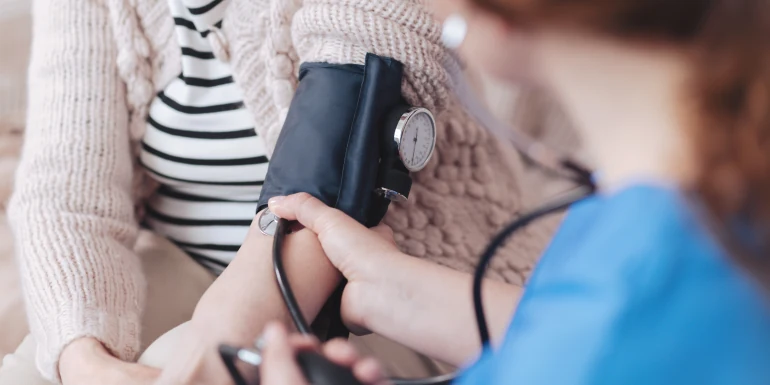
Hyperthyroidism: causes, symptoms and treatment
How do you know if you have hyperthyroidism? Does hyperthyroidism make you gain weight? Is hyperthyroidism painful? Find out more about hyperthyroidism, as well as its triggers and signs.
What is hyperthyroidism?
If you have hyperthyroidism, your metabolism is particularly active. What exactly happens if you have hyperthyroidism? The thyroid produces hormones in excessive quantities, causing a range of symptoms. About one person in every hundred suffers from hyperthyroidism. In most cases, hyperthyroidism develops between the ages of 20 and 50. This is known as acquired hyperthyroidism. It is much rarer for the condition to be inherited.
Hyperthyroidism: causes
Hyperthyroidism can be triggered by a number of different factors:
- Graves’ disease
- Thyroid autonomy, for example in the form of nodules that produce hormones independently
- Inflammation of the thyroid
- Excess iodine
- An overdose of thyroid hormones
- Benign and malignant tumours
Hyperthyroidism is most often caused by Graves’ disease or thyroid autonomy. The latter condition mainly occurs in the elderly.
Graves’ disease is an autoimmune disease that is one of the most common causes of hyperthyroidism. Around 70% to 80% of hyperthyroidism cases can be traced back to it. The disease is ten times more common in women than in men, which is why women are more likely to suffer from hyperthyroidism. The symptoms of Graves’ disease typically stem from the hyperthyroidism that it causes. That’s why Graves’ disease causes sufferers to lose weight rather than gain it, for example.
Hyperthyroidism: symptoms
Hyperthyroidism causes similar symptoms in men and women. How do I know if I have hyperthyroidism? The following signs could indicate hyperthyroidism:
- Increased perspiration: sensitivity to heat is one symptom of hyperthyroidism. Sufferers perspire more, and they easily feel too warm.
- Bulging eyes: if it is caused by Graves’ disease, hyperthyroidism also affects the eyes, potentially causing them to protrude. Patients become sensitive to light, and suffer from dry eyes.
- High blood pressure: another sign of hyperthyroidism is high blood pressure. This symptom of hyperthyroidism is often accompanied by tachycardia as well as (occasionally) cardiac arrhythmia.
- Losing weight: sufferers often experience an increase in appetite, but hyperthyroidism rarely causes them to gain weight. Instead, hyperthyroidism causes them to lose weight. How quickly does this happen? Sufferers typically lose weight within the space of a few weeks.
- Pain: hyperthyroidism can sometimes cause pain in the muscles.
- Reduced muscle formation: hyperthyroidism makes it more difficult to build up muscle mass on account of the increased metabolic rate.
- Fatigue: hyperthyroidism also causes tiredness, accompanied by exhaustion and weakness.
- Irritability: restlessness, irritability and nervousness are also potential symptoms of hyperthyroidism. Some sufferers experience mood swings, and can become aggressive.
- Swollen neck: hyperthyroidism may cause the neck to become swollen due to an enlarged thyroid.
- Hair loss: hyperthyroidism also causes hair loss. Sufferers’ hair is thin, and breaks more easily.
- Disrupted cycle: one symptom of hyperthyroidism in women is an irregular cycle.
- Erectile dysfunction: in men, hyperthyroidism may cause impotence.
- Loss of libido: losing interest in sex is another potential consequence of hyperthyroidism. This can occur in both men and women.
Disruptions to the function of the thyroid, such as hyperthyroidism, are more common during the menopause. The hormonal changes experienced during menopause can contribute to heart disease and osteoporosis, among other things, and hyperthyroidism or some other functional disorder can exacerbate these complaints. You should therefore see a doctor if you notice any of the symptoms of hyperthyroidism.
Hyperthyroidism: diagnosis
Diagnosing hyperthyroidism starts with your medical history. You discuss your symptoms and medical history with a medical professional. If hyperthyroidism is suspected, blood tests provide a definitive answer. The hormones TSH, T3 and T4 are relevant in this regard. When T3 and T4 are not bound to a protein, experts refer to them as “ft3” and “ft4”. In cases of hyperthyroidism, blood test results vary depending on what form the condition takes:
- Latent hyperthyroidism: In cases of latent hyperthyroidism, the level of TSH is lower than normal. For adults, this is between 0.27 and 4.20 µIU/ml (by volume). Both ft3 and ft4 are normal.
- Manifest hyperthyroidism: TSH levels are also lower in cases of hyperthyroidism.
If you have unusual blood test results and are also experiencing the symptoms of Graves’ disease, your doctor will test your blood for certain antibodies (TSH receptor antibodies or TRAb). In cases of hyperthyroidism, an ultrasound examination of the thyroid is generally carried out. A specialist takes a closer look at the size and structure of your thyroid. They may also carry out a scintigraphic scan. This is a test in the field of nuclear medicine that provides information on the activity of any nodules that may be present, as well as on the thyroid as a whole.
Hyperthyroidism: what can you do?
There are different ways to treat hyperthyroidism. The way in which hyperthyroidism is treated depends in part on the underlying cause:
- Hyperthyroidism medications: medications can be used to treat hyperthyroidism, particularly when Graves’ disease is the underlying cause. What tablets do professionals prescribe for hyperthyroidism? Sufferers usually take antithyroid agents, which work differently depending on their active ingredient. Most of them inhibit the production of hormones by the thyroid. Treatment usually lasts for a year. If the symptoms of hyperthyroidism persist, the doctor will choose a different method.
- Radioiodine therapy: physicians treat thyroid autonomy in particular using radioiodine therapy. They give the patient radioactive iodine in a capsule or by injection. The radiation emitted by the iodine destroys tissue in the thyroid. However, this can lead to hypothyroidism, which requires lifelong treatment with medication.
- Radiofrequency ablation: a probe is inserted through a small incision in the skin and used to heat the nodule from within in order to shrink it. This non-scarring procedure is suitable for symptomatic nodules that are not too close to the recurrent laryngeal nerve.
- Surgery: with surgery, the surgeon removes some or all of the thyroid. Undergoing this procedure may make sense in particular if the thyroid is enlarged. As with radioiodine therapy, there is a risk of hypothyroidism.
Please note: if you suffer from hyperthyroidism, you should ideally avoid exercise until the treatment has returned your hormone levels to normal. You should also avoid strenuous physical activity for a while after radioiodine therapy. Your best bet is to talk to your doctor about when you can exercise again if you suffer from hyperthyroidism.
Both hypothyroidism and hyperthyroidism are potentially dangerous if left untreated, because either can lead to a variety of complications. Both conditions require diagnosis and treatment.
Hyperthyroidism: nutrition
What else can you do if you have hyperthyroidism? Eating a balanced diet may help with the treatment of hyperthyroidism.
Hyperthyroidism: consequences
The consequences of leaving hyperthyroidism untreated vary:
- Cardiovascular disease: hyperthyroidism can potentially lead to heart failure and arrhythmia.
- Osteoporosis: with osteoporosis, the bones lose density due to accelerated bone remodelling caused by the hyperthyroidism.
- Rising blood sugar levels: if the hyperthyroidism is accompanied by diabetes, the need for insulin increases. This is because less sugar is getting from the blood into the cells of the body, and the liver is releasing more sugar into the blood.
- Thyrotoxic crisis: this complication causes sudden, severe symptoms such as a high fever, tachycardia, vomiting and unconsciousness. It is brought about by an extreme surplus of thyroid hormones and requires immediate medical assistance.
During pregnancy, the body produces the hormone hCG, which stimulates the production of thyroid hormones. This causes some women to develop hyperthyroidism during pregnancy. Treatment with medication is not usually required unless the hyperthyroidism is severe or persistent. In most cases, hyperthyroidism during pregnancy is caused by Graves’ disease. When does this become dangerous? It only poses a danger if it is left untreated, as it can then lead to miscarriage, stillbirth or premature labour, among other things.
By the way: radioiodine therapy cannot be used on pregnant women on account of the exposure to radiation. The same applies to breastfeeding mothers.
Preventing hyperthyroidism
Graves’ disease and thyroid autonomy are the two main causes of hyperthyroidism, and there is no way of preventing them. You can reduce the risks of other triggers, however. You should also make sure that you are getting enough iodine.
Hyperthyroidism can usually be treated. With a correct diagnosis and the right treatment, you can restore balance to your hormone levels. Look after your health, and consult a medical professional if you experience any symptoms.
The expert provided the editorial team with advice and input for this article. Dr Roman Trepp is Head of Endocrinology at the University Hospital of Bern’s Department of Diabetes, Endocrinology, Nutritional Medicine and Metabolism (UDEM).


Newsletter
Find out more about current health issues every month and get all the information you need about our attractive offers from all Helsana Group companies * delivered by e-mail to read whenever it suits you. Our newsletter is free of charge and you can sign up here:
We did not receive your information. Please try again later.
* The Helsana Group comprises Helsana Insurance Company Ltd, Helsana Supplementary Insurances Ltd and Helsana Accidents Ltd.